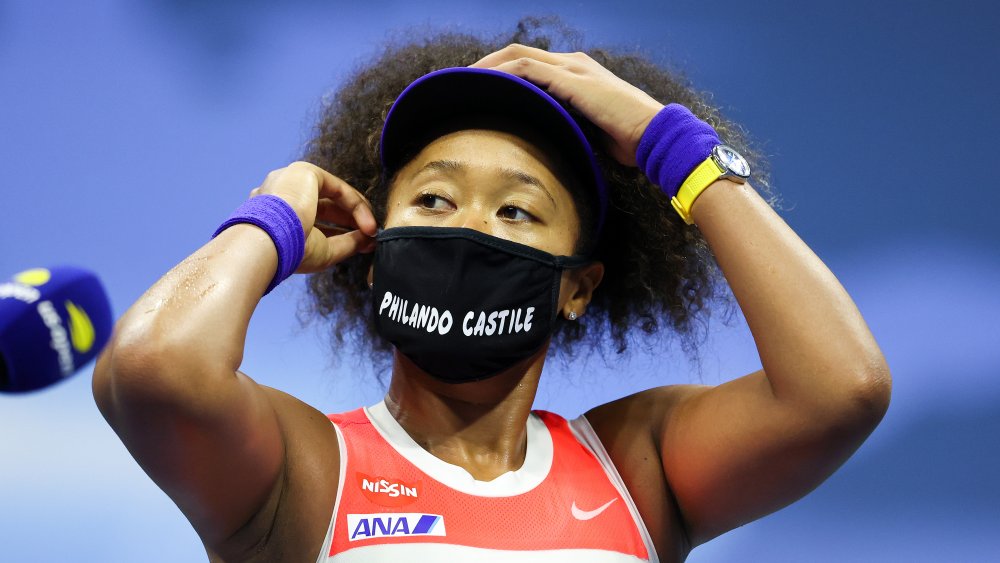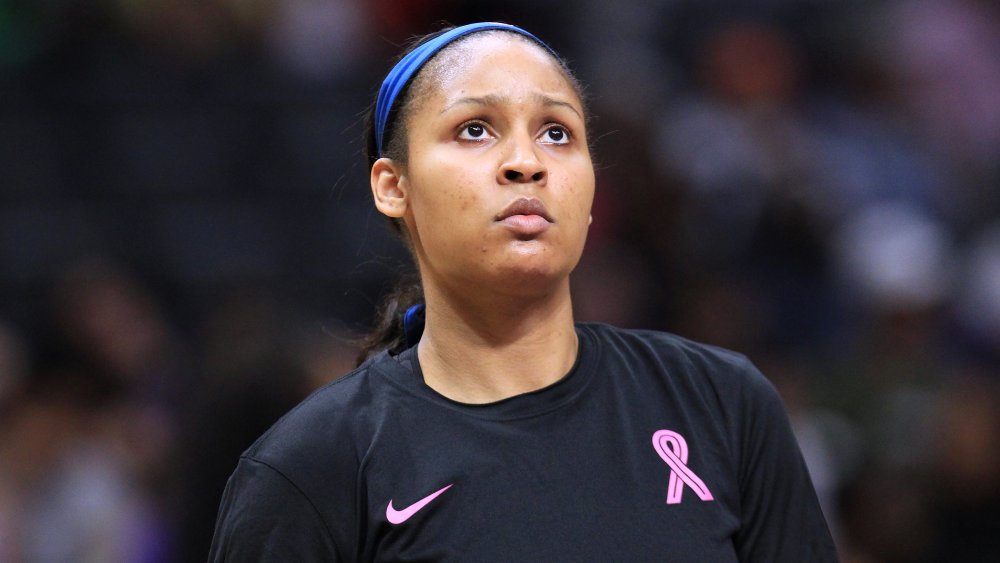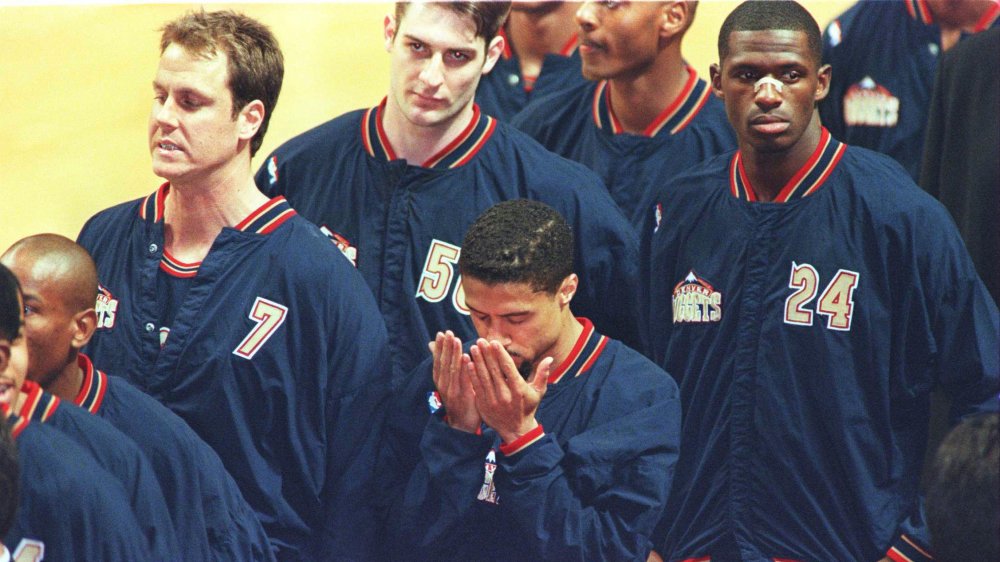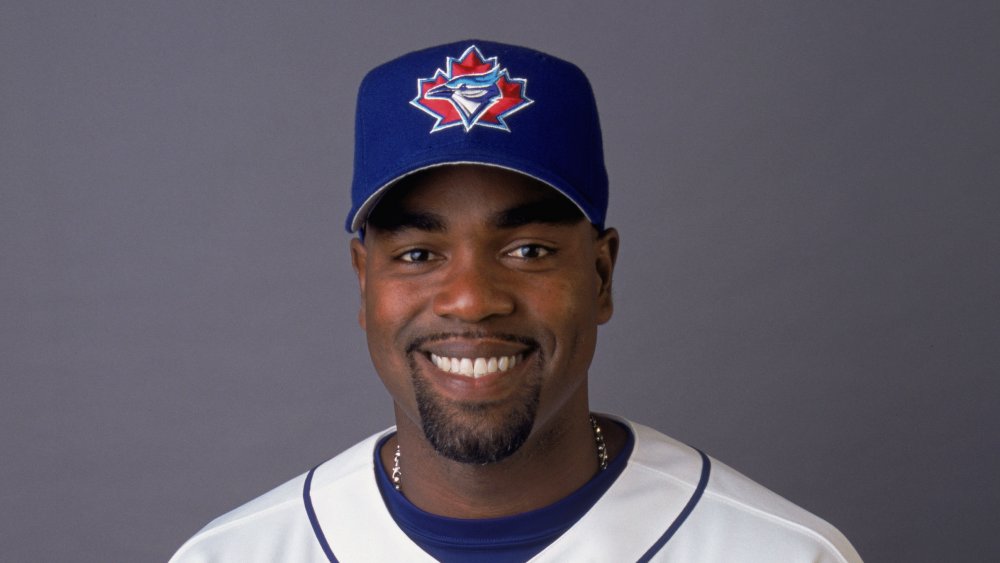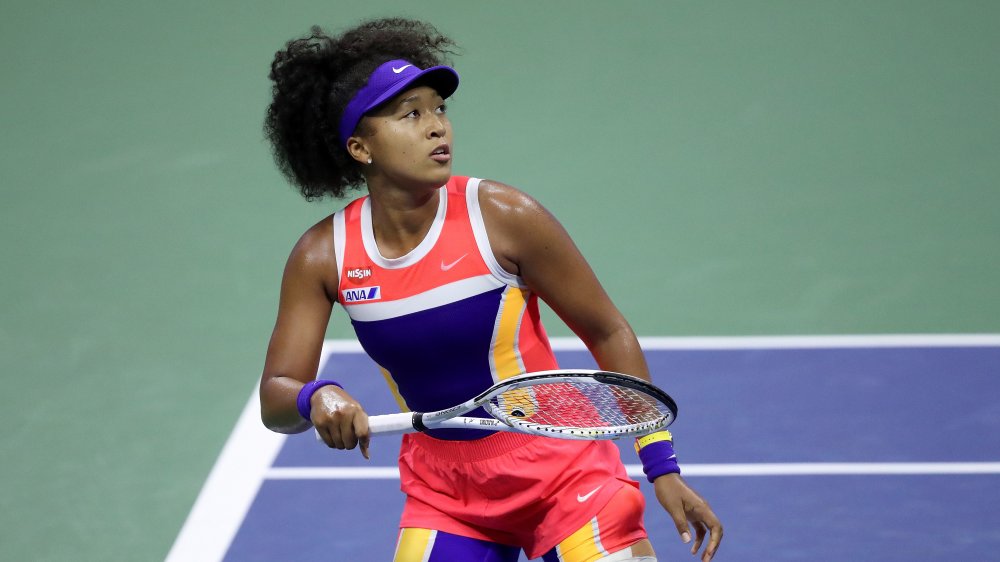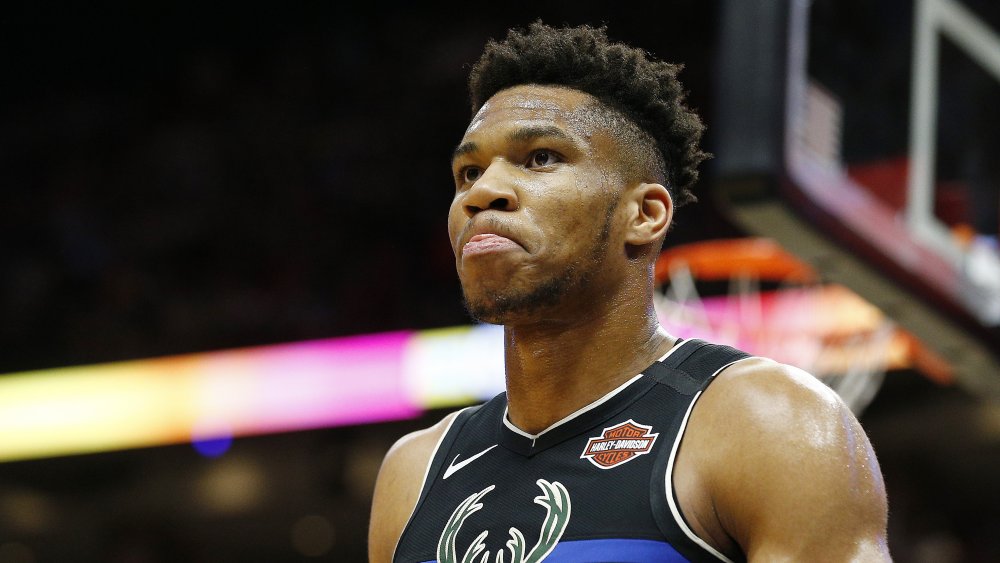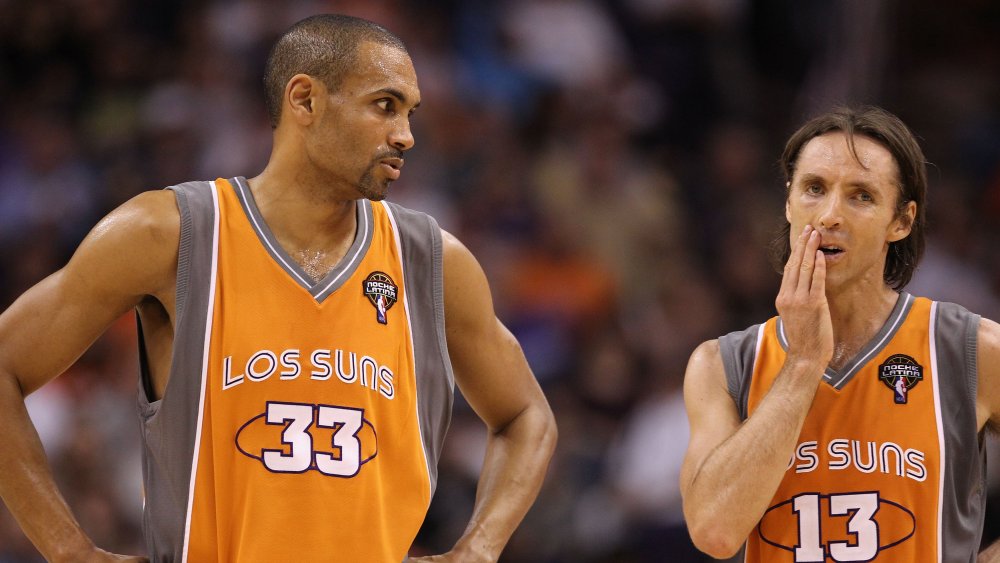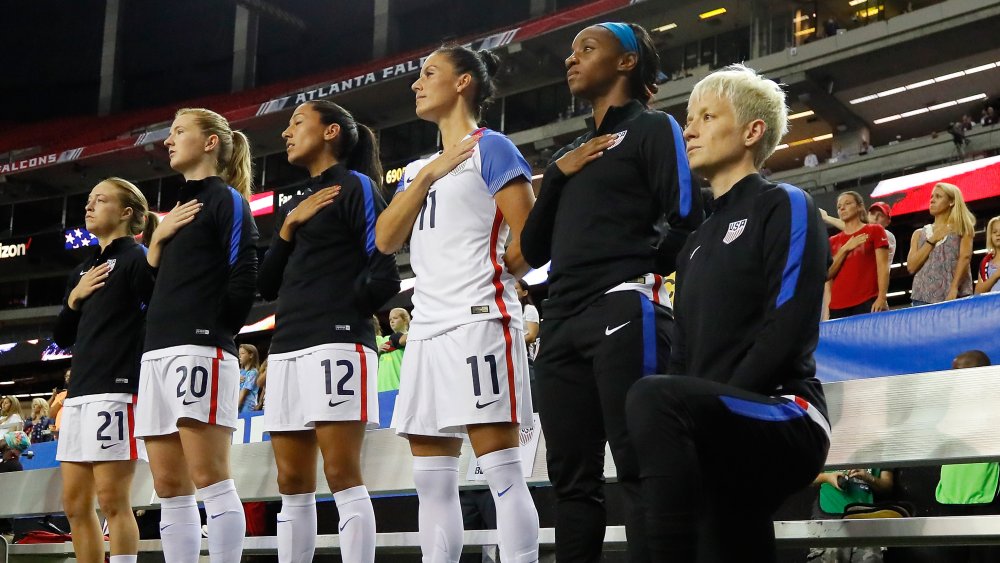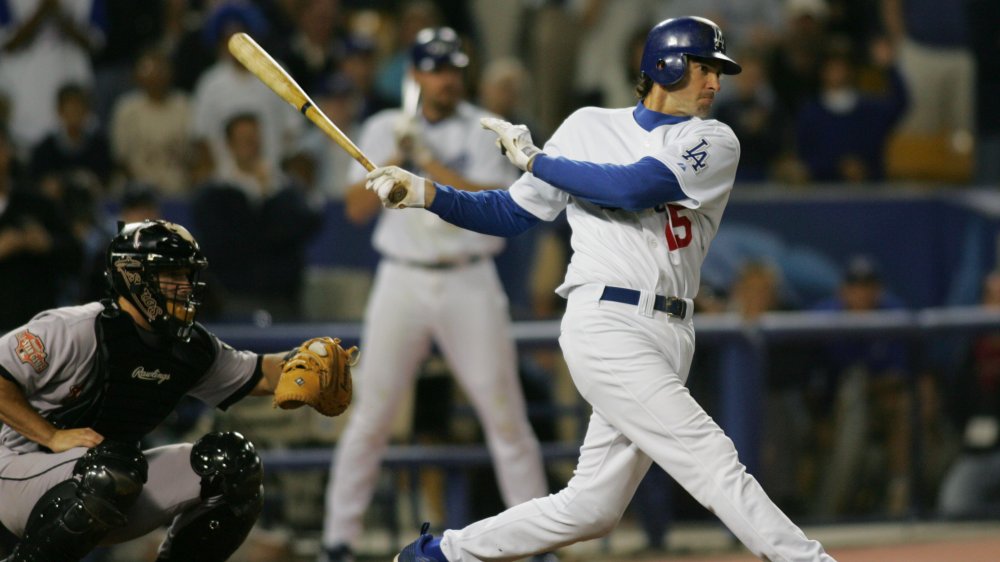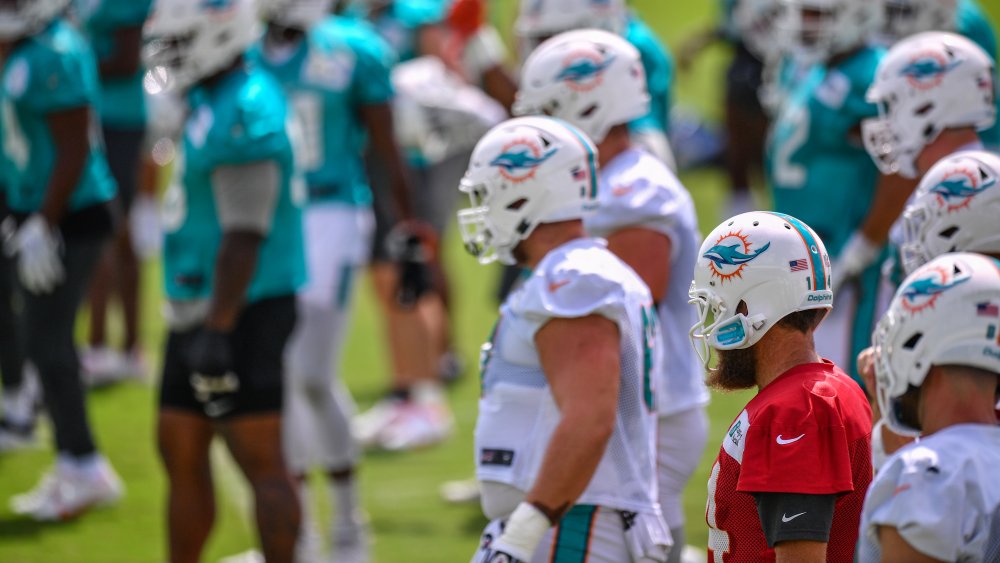The Most Dramatic Protest Actions Of Star Athletes
Tommie Smith and John Carlos' Black Power salute during the 1968 Olympics. Colin Kaepernick kneeling to protest police brutality. Jackie Robinson breaking the baseball color barrier in 1947. Katherine Switzer running the 1967 Boston Marathon. While many don't want to see politics in sports, the athletes who play them are just as political as everyone else. Politics and sports are as American as apple pie.
In 1966, arguably the most famous athlete in the world at the time, boxer Muhammad Ali, refused to fight in the Vietnam War on the grounds of his religious convictions and America's treatment of Black people. "My conscience won't let me go shoot my brother, or some darker people, or some poor hungry people in the mud for big powerful America," he said at the time, knowing he was sacrificing his career (via The Atlantic). "And shoot them for what? They never called me n****r, they never lynched me, they didn't put no dogs on me, they didn't rob me of my nationality, rape and kill my mother and father." He added, "Shoot them for what? How can I shoot them poor people? Just take me to jail."
While most athletes don't take such drastic actions as Ali did, they protest just the same over issues they believe in or advocate for those without a powerful voice. So let's take a time out and replay some of the most dramatic protest actions of star athletes.
Maya Moore put her career on hold to fight injustice
Minnesota Lynx small forward Maya Moore is one of the WNBA's biggest stars and a living legend. During her eight-year career in the league that began in 2011, Moore was Rookie of the Year, a four-time WNBA champion, has been named WNBA All-Star MVP three times, and was named the WNBA's Most Valuable Player in 2014. However, after the 2018 season, Moore shocked the sports world by leaving the WNBA in the prime of her career to advocate for the release of Jonathan Irons, a Black man who was convicted and sentenced to 50 years in prison for burglary and assault when he was just 16-years old by an all-white jury.
According to The New York Times, the homeowner claimed Iron perpetuated the crime, but "there were no corroborating witnesses, fingerprints, footprints, DNA or blood evidence to connect Irons to the crime." Moore and Irons met in 1998 when Moore was 16 during as part of her church's prison ministry, CNN reports. "When we take time to stand up for people, and to shine a light in a dark place, not everybody is going to like it," Moore said. "When it costs your comfort or maybe something that you just want to kind of check out and enjoy, I get that.
On July 1, 2020, a judge overturned Irons' conviction and ordered his release. Waiting for him when he walked out a free man? Maya Moore.
Mahmoud Abdul-Rauf took on the NBA over his religious beliefs
While a member of the Denver Nuggets in 1996, point guard Mahmoud Abdul-Rauf refused to stand for the National Anthem, citing his religious beliefs. Calling the American flag a "symbol of oppression, of tyranny," per The Washington Post, he added, "You can't be for God and be for oppression." The NBA then suspended him and fined him $31,707 per game for refusing to stand. "My beliefs are more important than anything," he said about the NBA's decision (via the Los Angeles Times). "If I have to give up basketball, I will."
He eventually worked out a compromise with the NBA that allowed him to bow his head and pray while the Star-Spangled Banner played. Two years later, he was out of the league. During a 2016 interview with The Undefeated, Abdul-Rauf said he had no regrets. "It's priceless to know that I can go to sleep knowing that I stood to my principles," he explained. "Whether I go broke, whether they take my life, whatever it is, I stood on principles. To me, that is worth more than wealth and fame."
Abdul-Rauf says what he went through was comparable to Colin Kaepernick. "No question. It's a duplicate pretty much," he told The Washington Post in 2017. "The hate mail, the attacks on his character, his personality, his race. 'As an athlete, this is not what you should be doing. You should be either a social activist or an athlete.' The same things."
Carlos Delgado refuses to stand for 'God Bless America'
According to the Chicago Tribune, the New York Yankees were the only major league park to play "God Bless America" in 2004 to support the Iraq War. While visiting Yankee Stadium as a member of the Toronto Blue Jays, Carlos Delgado remained in the dugout while the rest of the team and the crowd stood when the song played during the seven-inning stretch. "I never stay outside for `God Bless America,' " he said. "I actually don't think people have noticed it. I don't [stand] because I don't believe it's right, I don't believe in the war."
A Puerto Rico native, Delgado's thoughts on war were born from knowing the U.S. Navy used the Puerto Rican island of Vieques as a test bombing site for several decades. ”They lived in that target practice area for 60 years,” he said (via The New York Times). ”They tell you stories of how, in the middle the night, a bomb blew up. I never experienced it, but I can imagine it. I can see why you might be a little hostile from time to time. ”
The military stopped using the island in 2003, but what they left behind remains, Delgado says. "It's still in the environment, it's still in the ground, it's still in the water.” he said. ”That's why we've got the highest cancer rate of any place in Puerto Rico.”
Naomi Osaka refused to play for racial justice
Tennis star Naomi Osaka has always been an outspoken voice for racial in social justice. Whether it be her op-ed in Esquire following the death of George Floyd or her support of the Black Lives Matter protests across the country, the two-time Grand Slam champion consistently uses her platform to bring awareness to the issues she cares about.
But her most dramatic protest came in 2020 when she refused to play in her Western & Southern Open semifinal match to protest police brutality, specifically the shooting death of Kenosha, Wisconsin man Jacob Blake. "Before I am an athlete, I am a black woman," she wrote in a Twitter post. "And as a black woman, I feel as though there are much more important matters at hand that need immediate attention, rather than watching me play tennis. I don't expect anything drastic to happen with me not playing, but if I can get a conversation started in a majority white sport I consider that a step in the right direction."
"Watching the continued genocide of Black people at the hand of the police is honestly making me sick to my stomach," she added. "I'm exhausted of having a new hashtag pop up every few days and I'm extremely tired of having this same conversation over and over again. When will it ever be enough?"
The Milwaukee Bucks went on strike for racial justice
Naomi Osaka wasn't the only athlete to protest the shooting death of Jacob Blake. Three days after Blake's death, the Milwaukee Bucks refused to take the court for a scheduled playoff game against the Orlando Magic. In front of the media, Bucks players George Hill and Sterling Brown read the following statement:
"The past four months have shed a light on the ongoing racial injustices facing our African American communities. Citizens around the country have used their voices and platforms to speak out against these wrongdoings," the men read. "Over the last few days, in our home state of Wisconsin, we've seen the horrendous video of Jacob Blake being shot in the back seven times by a police officer in Kenosha and the additional shooting of protesters. Despite the overwhelming plea for change, there has been no action, so our focus today cannot be on basketball. "
"We are calling for justice for Jacob Blake and demand for the officers to be held accountable," the men continued. "For this to occur, it is imperative for the Wisconsin state legislature to reconvene after months of inaction and take up meaningful measures to address issues of police accountability, brutality, and criminal justice reform."
The Phoenix Suns protested an anti-immigration bill
In 2010, Arizona passed SB 1070 – one of the strictest anti-immigration laws at the time. Many immigration advocates slammed the law for encouraging racial profiling and illegal detention, but pushback against the law came from an unlikely source, the NBA's Phoenix Suns. Since the city and state have large Latino populations, the team felt the need to take advantage of the platform given to them by wearing "Los Suns" jerseys during their Western Conference Playoff Series against the San Antonio Spurs.
Suns Managing Partner Robert Sarver left no doubt that the jersey choice was political. "Our players and organization felt that wearing our 'Los Suns' jerseys on Cinco de Mayo was a way for our team and our organization to honor our Latino community and the diversity of our league, the State of Arizona, and our nation," he said (via NBA). "We are proud that 400 players from 36 countries compete in the NBA, and the league and the Suns have always considered that to be a great strength of the NBA."
"The frustration with the federal government's failure to deal with the issue of illegal immigration resulted in passage of a flawed state law," he added. "However intended, the result of passing this law is that our basic principles of equal rights and protection under the law are being called into question." In 2016, Arizona dropped most of the law's provisions due to countless lawsuits.
Megan Rapinoe kneeled in solidarity
Although she had been a professional soccer player since 2009, Megan Rapinoe garnered national attention in September 2016 when she took a knee before a game in solidarity with Colin Kaepernick. "It was very intentional," she told American Soccer Now. "It was a little nod to Kaepernick and everything that he's standing for right now. I think it's actually pretty disgusting the way he was treated and the way that a lot of the media has covered it and made it about something that it absolutely isn't. We need to have a more thoughtful, two-sided conversation about racial issues in this country."
While Kaepernick was protesting police brutality against Black people, Rapinoe used her own experience in America fighting for equal rights. "Being a gay American, I know what it means to look at the flag and not have it protect all of your liberties," she explained. "It was something small that I could do and something that I plan to keep doing in the future and hopefully spark some meaningful conversation around it."
She added: "It's important to have white people stand in support of people of color on this. We don't need to be the leading voice, of course, but standing in support of them is something that's really powerful."
Shawn Green stood by his religious beliefs
Shawn Green, who played 15 seasons in the major leagues before retiring in 2008, put his religious beliefs first and foremost. During his career, the former right-fielder and first baseman refused to play on Yom Kippur, a period of fasting and atonement that is considered the most important holiday in the Jewish faith.
Green was so committed to observing this holiday that he sat out games during a playoff run. "Everyone approaches their worship in their own way and goes about it differently," Green said in 2004 (via ESPN). "Playing one of the two is the most consistent with my beliefs as a Jewish person." He explained that although he wasn't orthodox, he felt obligated to respect his religion's customs. "I am Jewish and I respect the customs, and I feel like this is the most consistent way for me to celebrate the holiday," he said.
"I wish Yom Kippur could be in April, but it's not," he added (via The New York Times). "It's something I feel is an important thing to do partly as a representative of the Jewish community and as far as my being a role model in sports for Jewish kids, to basically say that baseball, or anything, isn't bigger than your religion and your roots." Green stressed that he was " totally committed" to the postseason and winning, but he was also committed to his religion. "I wish there was an easy solution, but there's not."
The Miami Dolphins protested the NFL's 'empty gestures'
In an effort to bring awareness to racial justice and equality in the wake of BLM protests, the NFL announced that each game would start with two songs: "The Star-Spangled Banner" and "Lift Every Voice and Sing," a song that is widely considered to be the Black national anthem. The Miami Dolphins weren't buying it. In a powerful video posted on September 10, 2020, the team and the head coach told the world they were going to sit out both songs, calling it "fluff and empty gestures."
"We need owners with influence and pockets bigger than ours," players say in the Dolphins' video. "And you fight for prison reform and innocent lives, and you repair the communities that were tossed to the side, and you admit you gained from it, and you swallowed your pride, and when greed is not the compass but the love is the guide, and when the courts don't punish skin color but punish the crime, until then, we'll just skip the long production, and stay inside," the players said.
The players blasted the NFL for performative gestures and for not donating to causes that support racial justice. The video ended with a message from head coach Brian Flores: "Before the media starts wondering and guessing, they just answered all your questions."We'll just stay inside."

